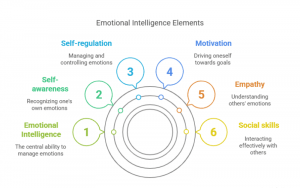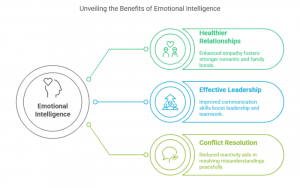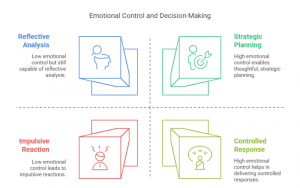In a world where IQ once dominated, the importance of developing emotional intelligence is now taking center stage. Whether you’re a manager, a student, or someone navigating relationships, EQ impacts how you connect, resolve conflict, and grow. But what is it really? Who does it affect? And how can you improve it? As a true citizen of the world, read on to unlock powerful insights!
What is Emotional Intelligence?
Emotional intelligence, or EQ, refers to the ability to understand, manage, and express one’s emotions, while also recognizing and influencing the emotions of others. Coined by psychologist Daniel Goleman, EQ encompasses five core elements:
- Self-awareness
- Self-regulation
- Motivation
- Empathy
- Social skills

Unlike IQ, which is largely fixed, EQ is a skill that can be developed throughout life [1].
Importance of developing emotional intelligence
In the workplace, studies show that people with high EQ tend to perform better, earn more, and lead more effectively. Emotionally intelligent people handle stress better, communicate clearer, and are more adaptable to change [2].
Stronger Relationships in Personal and Professional Life
People with high emotional intelligence are better listeners and communicators. They’re less reactive and more empathetic. This leads to:
- Healthier romantic and family relationships
- More effective leadership and collaboration at work
- Reduced misunderstandings and conflict resolution

Mental Health and Self-Regulation
EQ allows you to notice emotional patterns, such as anxiety triggers or signs of burnout, and handle them with mindfulness [3]. This reduces stress, boosts resilience, and increases overall well-being.
Career Advancement and Leadership
Recruiters now consider emotional intelligence as important, if not more than technical skills. Managers with high EQ create psychologically safe environments that retain talent and drive innovation.
As a citizen of the world, the ability to empathize across cultures and communicate with clarity is more vital than ever [4].
Better Decision-Making Under Pressure
With greater emotional control, you’re less likely to make impulsive decisions. EQ helps you:
- Stay calm in high-stakes situations
- See challenges from multiple perspectives
- Respond rather than react

How to Improve Your Emotional Intelligence
Practice Mindful Self-Awareness
Keep a journal of your emotions. Ask yourself daily: Why did I feel this way? How did I respond? Over time, patterns will emerge that offer insight.
Learn to Pause Before Reacting
Before responding emotionally, take a breath. This moment of pause allows your rational brain to catch up and decide the best action.
Cultivate Empathy Through Active Listening
Instead of planning your reply, focus entirely on what the other person is saying. Ask clarifying questions. This builds trust and mutual respect.
Seek Feedback and Reflect
Ask trusted peers or mentors about your emotional blind spots. Reflecting on their feedback is one of the fastest ways to grow [5].
Take EQ Assessments and Training
Many tools (like the EQ-i 2.0 or free online tests) can provide a baseline for your emotional intelligence and track your progress over time.
The Real-Life Impact: My Personal Story
I used to think emotional intelligence was just a buzzword. That changed during a heated team meeting a few years ago. A colleague misread my feedback as criticism. Tension escalated. I defended myself instinctively and the conversation went south.
Later that night, I reflected. If I had paused, shown more empathy, or acknowledged their emotions, things would have been different. That incident sparked my journey to improve my EQ. Since then, I’ve taken workshops, journaled emotions, and practiced mindful listening.
The change? Fewer conflicts, stronger collaboration, and deeper connections [4].
Have you ever had a similar experience? If so, maybe it’s time to unlock your emotional intelligence. To deepen your understanding, you may want to explore our reflection on Why is self-esteem important? & How It Can Transform Your Life, which delves into building strong self-esteem and its impact on personal growth.

Conclusion
In today’s fast-paced, emotionally charged world, the importance of developing emotional intelligence cannot be overstated. It impacts every area of your life, from relationships and mental health to career success and leadership.
Whether you’re leading a team, building a business, or simply seeking personal growth, investing in your EQ is a powerful move. As a lifelong citizen of the world, growing your emotional intelligence helps you connect and thrive across borders.
Start your journey today.
References
[1] Goleman, Daniel. (1995). Emotional Intelligence: Why It Can Matter More Than IQ. Bantam Books.
[2] Harvard Business Review – The Business Case for Emotional Intelligence.
[3] American Psychological Association – Mindfulness and Emotional Regulation.
[4] Greater Good Magazine – Why Emotional Intelligence Is More Important Than Ever.
[5] Positive Psychology – How to Improve Your Emotional Intelligence (EQ).
